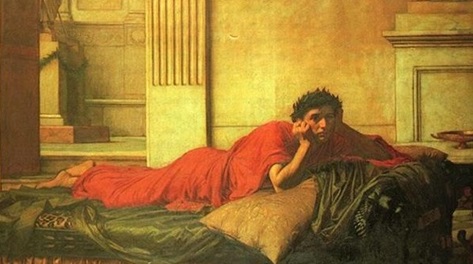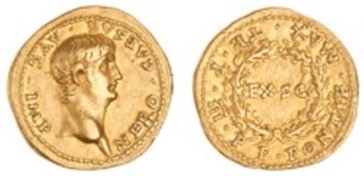
Introduction
Opinions of Nero’s character vary widely, illustrating the intricacies of his reign. Despite his reputation for murder and destruction, some modern historians argue that Nero was a victim of character assassination. These historians rightly point to positive developments during Nero’s reign, such as legal reforms, tax reforms, building projects, patronage, and more, to argue that Nero was an effectual emperor. This article leans heavily on the accounts of Tacitus and Suetonius to push back against the notion of Nero as a good emperor. Tacitus and Suetonius were close to the events. In fact, Tacitus was in Rome during the “Great Fire.” Finally, in an effort of transparency, it’s important to note that Tacitus and Suetonius did not hold favorable views of emperors.
Nero was born in 37 AD. Suetonius described Nero’s father, Gnaeus Domitius Ahenobarbus, as the grandson of Mark Antony and, despite his lineage, “a man hateful in every walk of life.” His mother, Agrippina the Younger, was the daughter of Germanicus and was an intelligent, ruthless, malevolent woman whose ambition was the driving factor in Nero becoming emperor. Agrippina’s ruthless ambition is well described by Tacitus regarding the alleged poisoning of Claudius: “long resolved on murder, eager to seize the proffered occasion.” Nero’s father died when he was three years old, and his mother was banished, leaving Nero to be raised by his aunt. Eventually, Emperor Claudius recalled Agrippina, and she took Nero under her wing, and he gained prominence by virtue of her influence. Agrippina was able to manipulate her way into becoming the wife of Claudius and was able to exert great control over him.
Once in the palace, Agrippina used her charms and conniving ways to secure the adoption of Nero and to convince Claudius that Nero, not his son Britannicus, should be his heir. Tacitus wrote, “The emperor yielded to the pressure, and gave Domitius (Nero), with his three years’ seniority, precedence over his son.” Under Claudius, Nero took on the consulship, and Claudius groomed him to be the next emperor while Agrippina pushed Britannicus further into the background.
After Claudius’ death, Nero was named emperor. Nero’s reign opened with several years of good government, but his erratic behavior and violent character proved impossible to contain. Despite murdering anyone in his way (including family members), Nero remained popular with the people until the Great Fire. Many blamed Nero for the Great Fire, and his popularity collapsed. As news of his death hit the streets, the public celebrated. Suetonius asserts, “such was the public rejoicing that the people put on liberty-caps and ran about all over the city.” The Great Fire of Rome and the murder of many, including his own family members, demonstrate that Nero was a malevolent maniac.
Britannicus
While not blood relatives, Britannicus and Nero became foster brothers following Nero’s adoption. Britannicus’ murder serves as a chilling illustration of Nero’s malevolent nature. Nero perceived Britannicus as a rival and a threat due to his status as Emperor Claudius’ son. The tension between the two seems to be genuine. Tacitus alleges that before Nero was emperor, both boys were at the games at the Circus, where Britannicus referred to Nero as “Domitius.” This alleged insult led to Agrippina complaining to Claudius and the banishment and execution of Britannicus’ tutors. In Suetonius’ account of this same story, it suggests that Nero complained to Claudius.
During the celebration of Saturnalia, Nero attempted to embarrass Britannicus. Tacitus notes, “he commanded Britannicus to rise, advance into the centre, and strike up a song — this, in the hope of turning into derision a boy who knew little of sober, much less of drunken, society.” Britannicus won the people’s sympathy by singing about being cast aside by his father. Nero backfired on his plan to humiliate Britannicus, and in fits of outrage, began plotting Britannicus’ death, which he carried out with poison. Suetonius’ account is virtually identical but mentions that Britannicus had a good singing voice. Nero may have been irritated with Britannicus’ gift for singing, but the lineage posed the most risk. Suetonius asserts, “he attempted the life of Britannicus by poison not less from jealousy of his voice (for it was more agreeable than his own) than from fear that he might sometime win a higher place than himself in the people’s regard because of the memory of his father.” After Britannicus’ death, Nero blamed “falling sickness,” hastily buried him, and rewarded the assassin with a large estate.
Agrippina
Perhaps nothing demonstrates Nero’s sinister character more than the murder of his own mother. In the early years of Nero’s reign, his mother kept him under her thumb while Seneca and Burrus guided the affairs of the state, resulting in good governance. Tacitus provides an example of this interplay: “when an Armenian deputation was pleading the national cause before Nero, she was preparing to ascend the emperor’s tribunal and to share his presidency, had not Seneca, while others stood aghast, admonished the sovereign to step down and meet his mother.”
Agrippina was wary of her waning influence and threatened Nero’s love interests. She became so desperate to keep Nero under her control that she even stooped to incest. Tacitus writes, “Agrippina’s ardour to keep her influence. . . presented herself on several occasions to her half-tipsy son, coquettishly dressed and prepared for incest.” Similarly, Suetonius writes: “even before that, so they say, whenever he rode in a litter with his mother, he had incestuous relations with her, which were betrayed by the stains on his clothing.” Despite these accounts, Nero had grown tired of his mother’s criticism and meddling and eventually drove her from the palace and stripped her of her honors.
Even after removing her from the palace, Nero still felt threatened by his mother’s existence and decided to murder her. Agrippina survived the initial murder plot, which would have seen her die at sea. The news of her survival reached Nero who panicked and feared that his mother would seek revenge. The timely arrival of Agrippina’s messenger led to a new scheme. Nero threw a dagger at the messenger’s feet and accused him of being an assassin sent by Agrippina to murder him. Of course, Nero had no choice but to order his mother’s execution. The fabricated story would conclude that his mother committed suicide after learning that Nero had discovered her plot.

Octavia
The murder of Octavia demonstrates the pitilessness and evilness of Nero. Octavia was the daughter of Claudius and, while engaged to another, had become engaged to Nero due to Agrippina’s scheming. Tacitus writes, “Octavia’s engagement followed; and Domitius — who, over and above his former relationship to the Emperor, was now his plighted son-in‑law — began to assume equality with Britannicus, thanks to the zeal of his mother.”
Nero was not interested in Octavia and had fallen in love with a woman named Poppaea. Nero wanted to marry Poppaea and divorced Octavia because she could not bear a child. Nero further accused Octavia of having an affair with a slave and banished her to Campania. According to Tacitus, the banishment drew sympathy and outraged the public.
Due to the public’s pressure, Nero recalled Octavia. However, once again, Nero proclaimed that she had committed adultery with the prefect and banished her to Pandateria, where she met a cruel and horrific end. Tacitus writes, “she was tied fast with cords, and the veins were opened in each limb: then, as the blood, arrested by terror, ebbed too slowly, she was suffocated in the bath heated to an extreme temperature.”
Poppaea
Poppaea also met her end due to the actions of Nero, although the accounts range from manslaughter to willful murder; if willful murder, it is clearly a depraved act. Tacitus’ account asserts that an enraged Nero killed the pregnant Poppaea by kicking her in the stomach. Tacitus writes, “Poppaea met her end through a chance outburst of anger on the part of her husband, who felled her with a kick during pregnancy.” Tacitus also mentions rumors that she had been poisoned but rejects the claim: “That poison played its part I am unable to believe, though the assertion is made by some writers less from conviction than from hatred.” Suetonius’ account reads, “he caused her death too by kicking her when she was pregnant and ill, because she had scolded him for coming home late from the races.”
The Great Fire
If Nero is responsible for the Great Fire, it would be one of the worst acts of malevolency by a leader on their people. The word “if” is used because of conflicting accounts in the sources. Suetonius and Dio lay the blame directly on Nero. For example, Suetonius wrote, “But he showed no greater mercy to the people or the walls of his capital. When someone in a general conversation said: ‘When I am dead, be earth consumed by fire’ he rejoined ‘Nay, rather while I live,’ and his action was wholly in accord.” In Roman History, Dio blames Nero for the fire and also asserts Nero kept the fire burning: “He secretly sent out. . . and caused them at first to set fire to one or two or even several buildings in different parts of the city, so that people were at their wits’ end, not being able to find any beginning of the trouble nor to put an end to it.” Presenting a different view, Tacitus writes, “There followed a disaster, whether due to chance or to the malice of the sovereign is uncertain.”
Whether or not Nero was responsible for The Great Fire, it marked a turning point in his reign. Despite his volatile behavior, there is no indication that the public disliked him. However, after the calamity Nero became unpopular across all classes of society. The poor suffered displacement, the wealthy grew irritated by the high costs of reconstruction, and most people felt disgusted with the construction of The Domus Aurea (a lavish new palace). Aware of the damage to his public image, Nero scapegoated Christians, subjecting them to gruesome murders. Tacitus writes, “they were covered with wild beasts’ skins and torn to death by dogs; or they were fastened on crosses, and, when daylight failed were burned to serve as lamps by night.”
Conclusion
Nero inherited many of Agrippina’s worst traits, as she was one of the most ambitious, murderous, and evil women in Roman Empire history. Nero’s early years as emperor were years of high-quality government thanks in large part to the competent guidance of Seneca and Burrus. Despite Seneca and Burrus’ best efforts, Nero could only restrain the monster within him for so long. Nero’s cruelty towards both family and non-family members alike demonstrates that he was indeed a malevolent maniac.

History is full of questions, and I enjoy trying to find answers to those questions. I hold two master’s degrees, one in History, and the other in Theological Studies. I enjoy ancient & classical history, the early church, European history, golf, basketball, dogs, and more. I spend my free time reading, writing, and watching historical documentaries. You can reach out to me at: wadleydd@gmail.com




